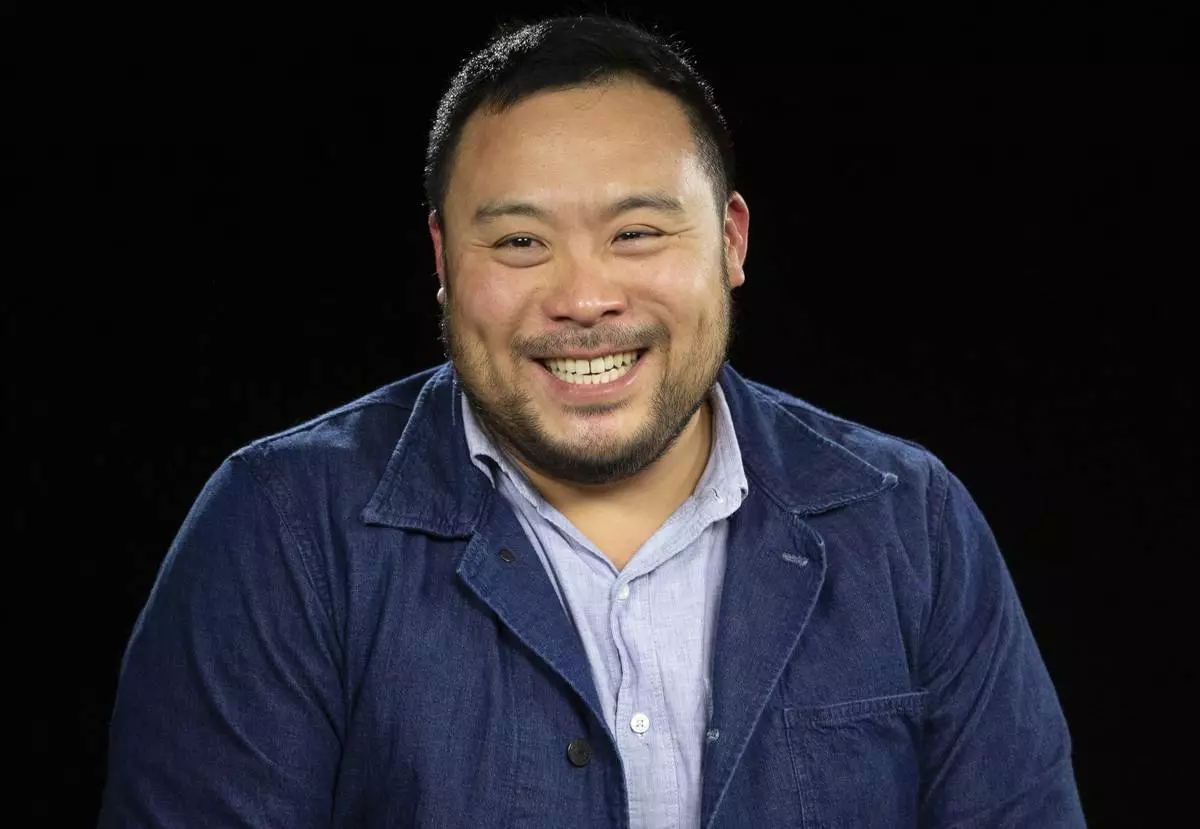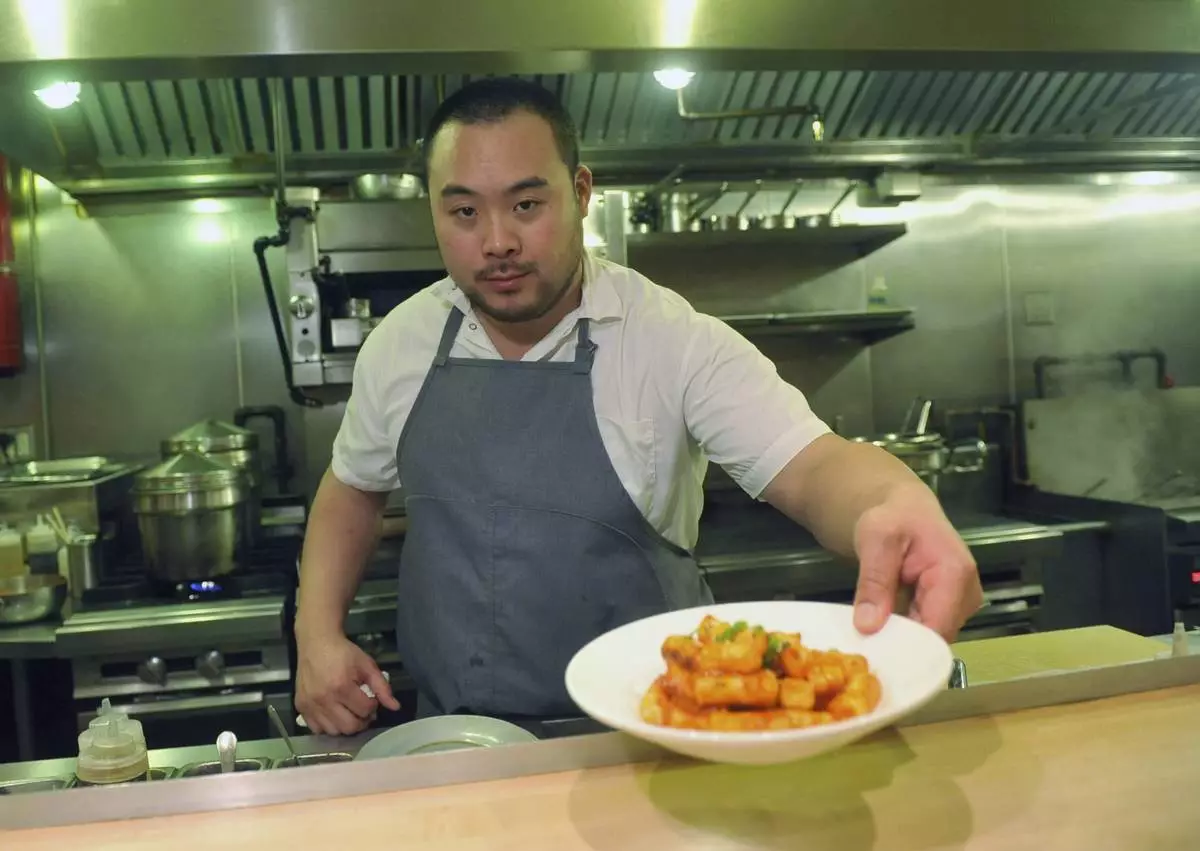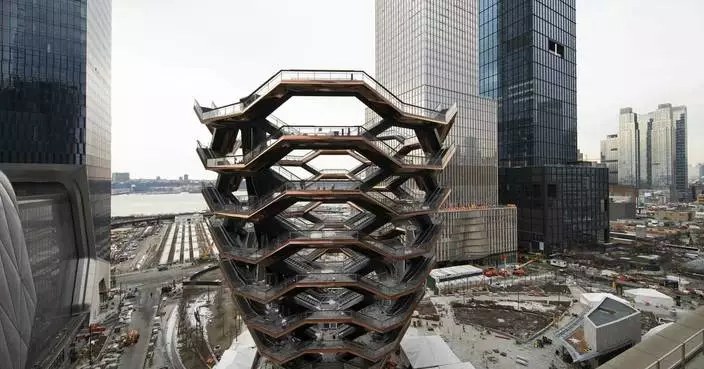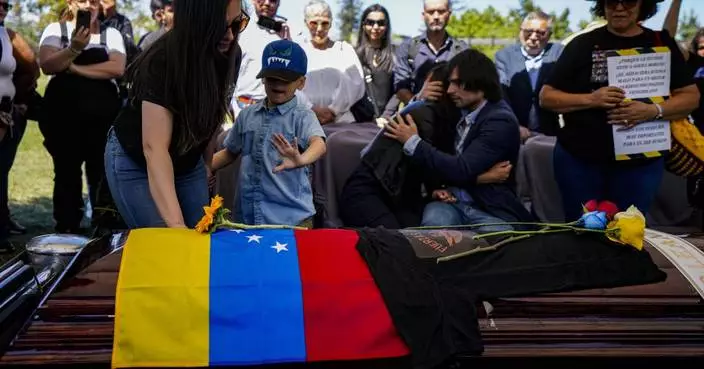As he does during every papal visit, Pope Francis produced plenty of surprises in Chile: He married a couple during a flight, stopped his motorcade to help a fallen police officer and wept with victims of sex abuse by priests.
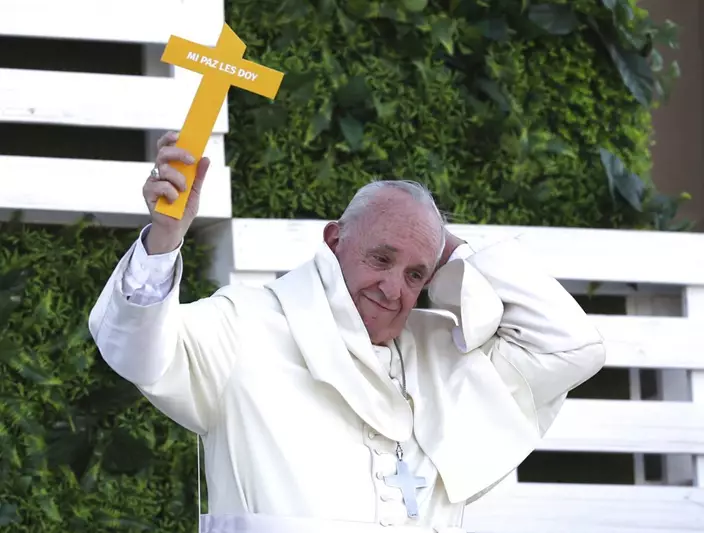
Pope Francis loses his skull cap, as he holds up a cross that reads in Spanish "I give you my peace" upon arrival to meet with youths at the Shrine of Maipu in Santiago, Chile, Wednesday, Jan. 17, 2018. (AP Photo/Alessandra Tarantino)
But the pope also faced protests and a level of hostility unheard of in modern times for a papal visit. Anti-pope protests had to be broken up with tear gas, attackers burned at least 11 Roman Catholic Churches and pamphlets were found threatening Francis that the "next bomb would be in your cassock."
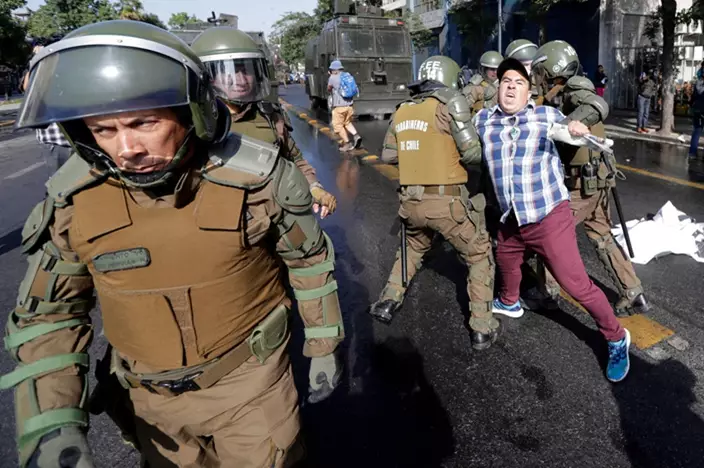
A man is arrested during a protest against Pope Francis in Santiago, Chile, Tuesday, Jan. 16, 2018. The pontiff is visiting Chile Jan. 15-18, where the Vatican's handling of sex abuse cases has fueled bitter criticism. (AP Photo/Victor R. Caivano)
"This kind of violence during a papal visit is absolutely unprecedented. And Chile is historically a very solidly Catholic nation," said Andrew Chesnut, the Catholic Studies chair at Virginia Commonwealth University.
It remains to be seen whether the friction in Chile was a fluke or a harbinger of what to expect in future papal trips.
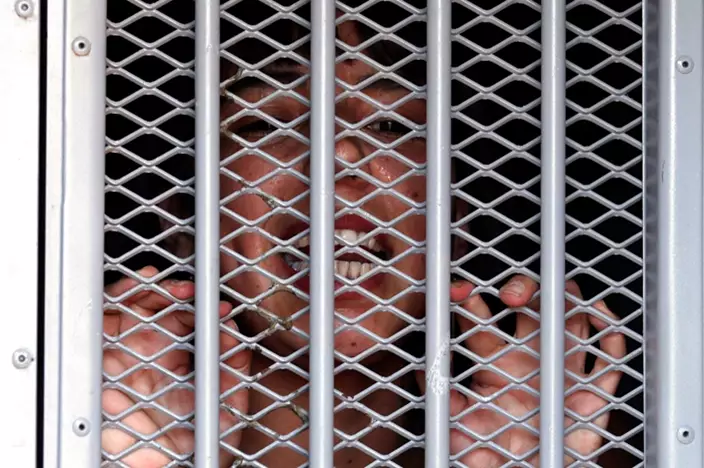
A woman cries out from inside a paddy wagon after being arrested during a protest against Pope Francis in Santiago, Chile, Tuesday, Jan. 16, 2018. The pontiff is visiting Chile Jan. 15-18, where the Vatican's handling of sex abuse cases has fueled bitter criticism. (AP Photo/Victor R. Caivano)
The neighboring country of Peru, where Francis went Thursday, isn't taking any chances. Authorities have banned demonstrations because they "impact the image of the country," police spokeswoman Veronica Marquez said.
Papal visits sometimes attract demonstrations. In 2010, thousands in London protested the visit of Pope Benedict XVI, condemning his stance on condoms, women's rights and homosexuality, among other things. But the ferocity and firebombing of churches in Chile went beyond anything in modern memory.
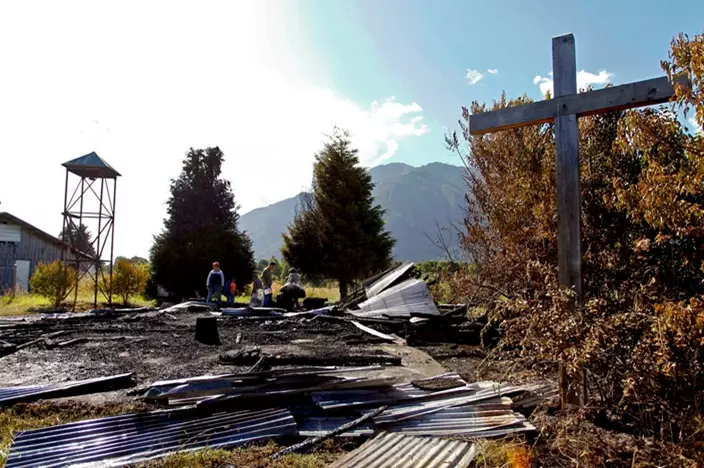
People search through the charred remains of the Santa Juana Catholic chapel in the Alta Can Can community in Cunco, Chile, Tuesday, Jan. 16, 2018. Three churches including Santa Juana have been firebombed in Chile on the first full day of Pope Francis' visit to the Andean nation. (AP Photo/Dragomir Yankovic/Aton Chile)
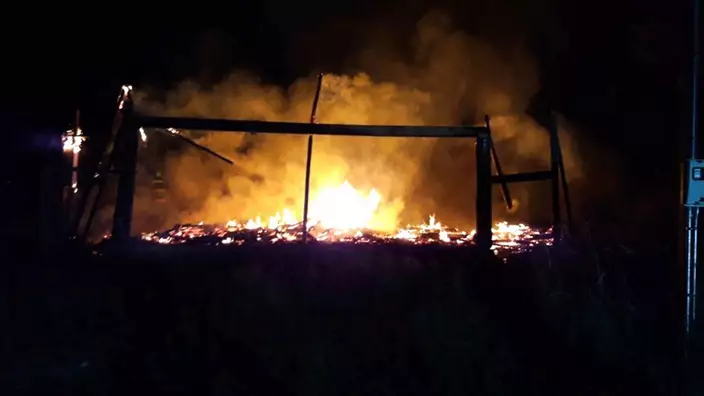
Flames engulf the Santa Juana Catholic chapel in the Alta Can Can community of Cunco, Chile, Tuesday, Jan. 16, 2018. (Alejandro Hidd via AP)
"These violent acts may be a first in the history of the 'traveling papacy,'" said Massimo Faggioli, a theology professor at Villanova University in Philadelphia. "It is striking also because Latin America is supposed to be friendly territory for Francis" — the first pope from the region.
Chile has changed radically, from its economy to politics, in less than a generation. Those changes, combined with a pedophile priest scandal and what many argue was a bungled response by the church, has accelerated a move away from Catholicism. Last year, 45 percent of Chileans identified as Catholic, a sharp drop in just a decade from the mid-60s, according to Latinobarometro's annual poll.
One of the pope's sharply contested decisions — to appoint a Chilean bishop with close ties to the country's most notorious pedophile priest — soured many on the visit before it even began.
A few days before Francis arrived, a group angry about the cost of the papal visit briefly occupied the Nunciature in Santiago where the pope would sleep.
The same day, several churches were burned. Over the next couple of days during the pope's visit, several more churches were torched, along with three helicopters.
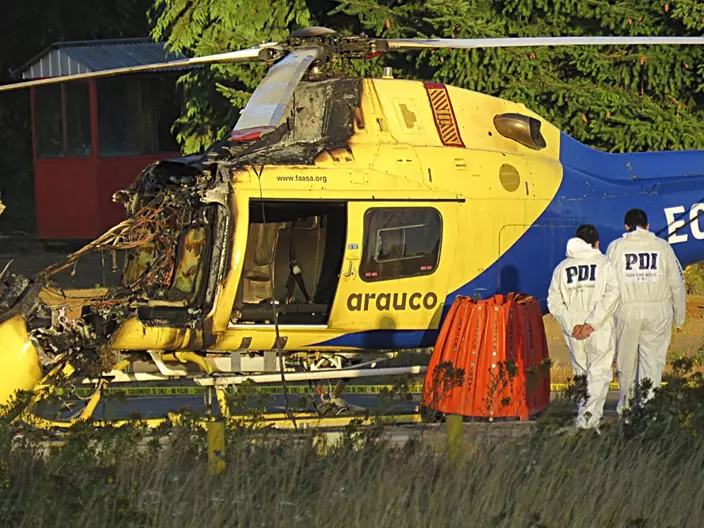
Chilean Investigative Police, PDI, inspect a helicopter burned at the Arauco Forestry company in Caranilahue, Temuco, Wednesday, Jan. 17, 2018. (Manuel Araneda, Aton Chile via AP)
It was unclear who was behind the arson attacks. Outside some of the churches, pamphlets were found supporting the cause of indigenous Mapuche. Pamphlets outside one threatened the pope.
The Mapuche, Chile's largest indigenous group, are fighting for a return of ancestral lands, recognition of their language and an end to discrimination.
Much of Francis' trip was dedicated to the conflict. During his homily Wednesday in the heart of Mapuche territory, he took both the Mapuche and Chilean officials to task, calling for a halt to violence and for government engagement that goes beyond just "elegant" agreements.
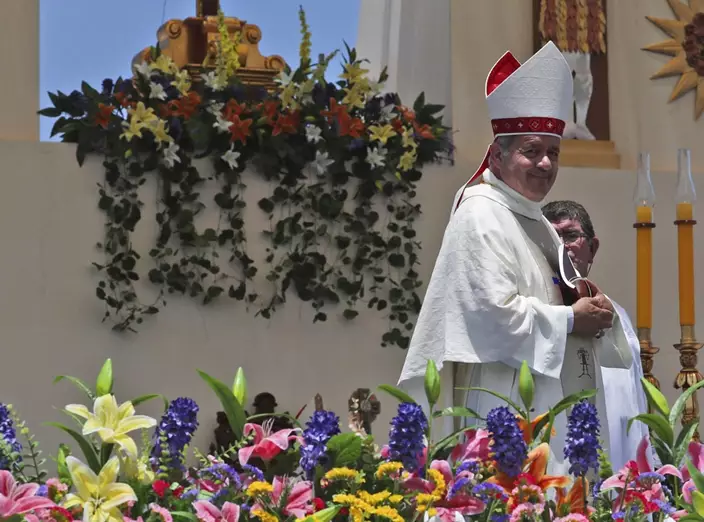
Osornos Bishop Juan Barros smiles as he leaves the altar after Mass was celebrated by Pope Francis on Lobito Beach in Iquique, Chile, Thursday, Jan. 18, 2018. (AP Photo/Alessandra Tarantino)
The burning of churches is a tactic frequently employed by radical Mapuche groups: Nearly two dozen have been firebombed the last two years. That 11 were then attacked in just a few days is a possible sign that these groups saw the visit as an opportunity to bring more attention to their cause.
"The burning of churches is an expression of the disgruntlement" that many Mapuche feel for the Catholic Church, said German Silva, a political analyst at the Universidad Mayor in Santiago.
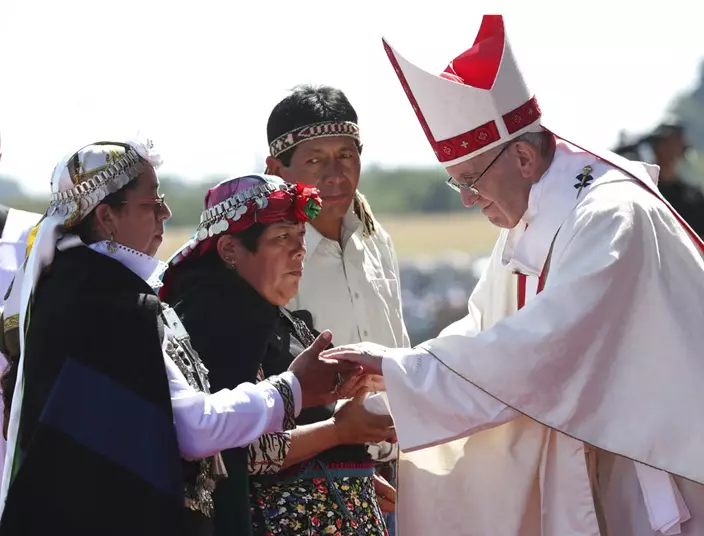
Pope Francis greets Mapuches in an offertory of a Mass at the Maquehue Air Base, in Temuco, Chile, Wednesday, Jan. 17, 2018. (AP Photo/Alessandra Tarantino)
During Chile's 1973-1990 dictatorship, several bishops spoke out in defense of human rights and worked closely with indigenous populations. Today's bishops are much less visible, arguably less hands-on with the poor and in general the church has nowhere near the same moral authority.
Other groups protested the pope himself. While Francis celebrated Mass on Tuesday at a large park in Santiago, riot police shot tear gas and arrested dozens of protesters as they tried to march on the service.
Protesters included members of the country's LGBT community, socialists and people angry at the church's reaction to the sex abuse scandal that many Chileans don't feel has been resolved.
"There will be no peace for an accomplice who helps and protects a rapist," read one sign.
"Burn, Daddy!" read another.
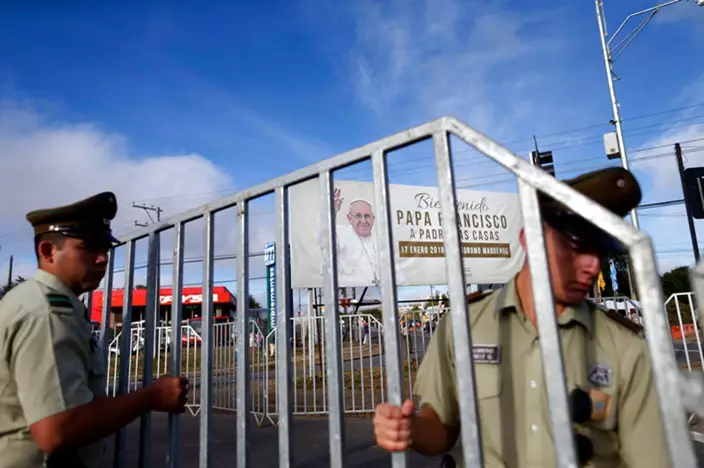
Police set up crowd control barriers in preparation for the arrival of Pope Francis at the Maquehue Air Base, in Temuco, Chile, Wednesday, Jan. 17, 2018. (AP Photo/Luis Hidalgo)
Hours before Francis left Chile, he made comments that all but overshadowed his entire visit, and certainly would have added to the protests if they had come sooner. When asked why he defended Bishop Juan Barros, the former protege of the pedophile priest, Francis said there was no proof Barros knew about the abuse and called those accusations against him slanderous.
"After saying those things, if he came back here his reception would be even worse," said Erivano Luna, a computer technician in Santiago.



